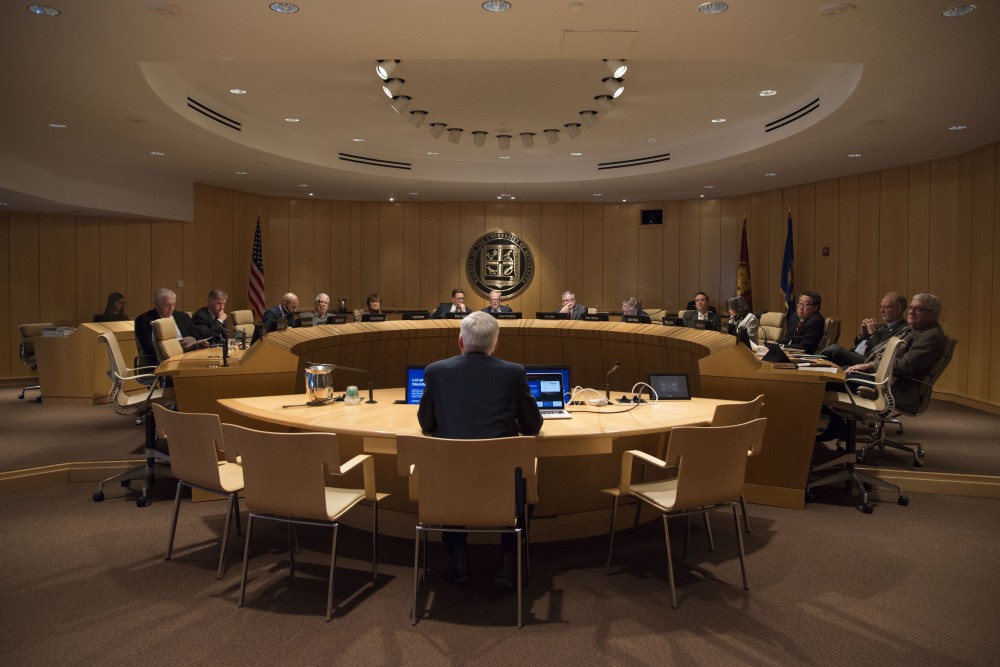Two University Senate committees say some University of Minnesota regents violated their guiding principles when criticizing the task force that wrote a report recommending renaming four University buildings.
The Social Concerns Committee and Equity, Access, and Diversity Committee are co-authoring a statement reprimanding the Board of Regents for their perceived disrespect toward faculty who authored the report. The committees say the regents framed task force members as politically motivated, creating an atmosphere that could chill discussion required to resolve the building name dispute.
“It’s going to be hard to get people to volunteer on task forces … if the integrity of the people on task forces who are arguing difficult positions is fair game,” said EAD member Deena Wassenberg.
At their March 8 meeting, several regents criticized the 125-page report’s rigor and insinuated its authors excluded evidence to satisfy a preconceived intention to rename Coffman Union, Nicholson Hall, Middlebrook Hall and Coffey Hall. Regent Michael Hsu has since called for an investigation into whether task force members omitted evidence.
At the meeting, Hsu said the report was unfair and excluded important material. Regent Darrin Rosha compared the report to a trial.
Hsu said the task force omitted letters that demonstrated former University president Lotus Coffman was only doing what the regents at the time insisted.
“The search for truth is one of the underpinnings of academic freedom. Without the honest presentation of the facts, the process cannot continue,” Hsu said in a text message to the Minnesota Daily. “[Task Force members] have lost all credibility as far as I’m concerned.”
Board of Regents policy states the University must create an environment of respect and integrity that fosters the open exchange of ideas. SCC Chair Ingrid Nuttall said the regents did the opposite.
“It’d be difficult to watch that regents meeting and feel there was a dialogue,” Nuttall said. “The spirit of those conversations needs to be in good faith.”
At their meetings Monday, committee members voiced concern about the climate created by the regents’ comments.
Regent Rosha’s comment about “expecting white-hooded, brown-shirt-wearing racists spewing all of this kind of vitriol” was condemned for its perceived “smoking-gun” standard for proof.
“Racism isn’t wearing a Ku Klux Klan hood. Racism involves things like systematic discrimination and removal of African American students from dormitories,” said SCC member Melissa Sellew. “I’m so disappointed in the disrespect for scholarship. This is an institution for learning.”
EAD member Jeremy Jenkins said it was “unnerving” to hear the regents accuse faculty of being unethical and irresponsible.
The committees’ statement is the latest in a series of rebukes from top University administrators and faculty governance. President Eric Kaler said in a March 14 campus-wide email that he was troubled by the regents’ “lack of respect for the efforts and the sincerity and integrity of our distinguished faculty.”
John Coleman, Task Force on Building Names and Institutional History co-chair, said he “was troubled by the poor treatment of our faculty” in an email to the Minnesota Daily.
The Faculty Consultative Committee said in a March 15 letter to the Board of Regents that comparing the report to trial proceedings “set a tone and burden of proof inconsistent with the task at hand.”
The March 8 meeting ended before task force members could respond to the regents’ criticisms. Board Chair David McMillan said the board would continue the discussion at their May meeting, but the letter said the time constraints made the discussion appear “one-sided.”
Hsu said his he’s disappointed that the report is being defended by deans, faculty and administrators in a text message to the Minnesota Daily.
The FCC called for the regents to convene a special meeting devoted to discussing the renaming question in a venue other than the Board of Regents boardroom. FCC chair Amy Pittenger said a different setting might help set a different tone and foster a more open discussion.
She said going forward, the discussion needs to be grounded in the University’s shared values.
“We can disagree, but that doesn’t mean we’re enemies,” she said. “Let’s remember: we all love the University of Minnesota and we all want what’s best for it.”








